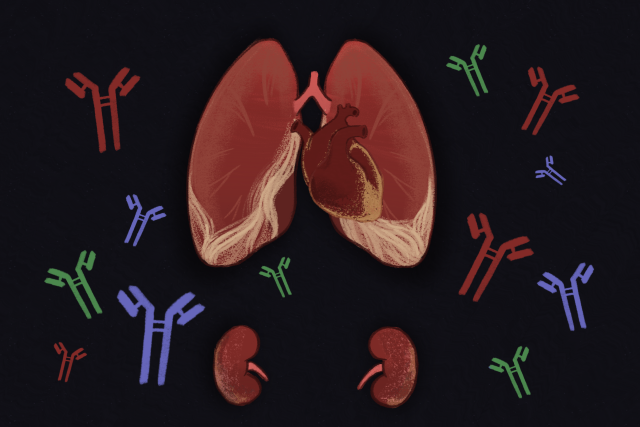[ad_1]
The University of Michigan John Varga Lab, in collaboration with the Mayo Clinic and Northwestern researchers, published an article last year suggesting that a heavy-chain monoclonal antibody, Ab68, prevents fibrosis in mouse models. Ab68 works by inhibiting the release of CD38, an enzyme found elevated in patients with scleroderma. CD38 causes a metabolic change, breaking down and reducing the levels of NAD+, a coenzyme necessary for metabolism. This leads to weakness, loss of muscle strength, degeneration of blood vessels and other scleroderma symptoms. Scleroderma is a category of conditions affecting the skin. Systemic sclerosis is a category of scleroderma causing irreversible scarring in the lungs, heart and kidneys. This chronic autoimmune disease currently has no preventative treatment.
Dr. John Varga, rheumatology, internal medicine and dermatology professor, said in an interview with The Michigan Daily that he was excited by the scientific potential created by the successful usage of Ab68 to block CD38 in mouse models.
“What we found is that the mice get much less scarring compared to the mice that got a control treatment, a placebo,” Varga said. “It’s kind of exciting because this is what we would call a proof of principle, meaning that at least it shows that this idea that you can block CD38 could ultimately go into people.”
Bo Shi, research associate professor at Northwestern University and first author of the article, wrote in an email to The Daily about the lab’s promising discovery that the Ab68 antibody increases NAD+ levels without damaging cells.
“This research shows that using antibodies to specifically block CD38’s activity, without harming cells or shutting down CD38 entirely, can increase NAD + levels in tissues,” Shi wrote. “This targeted method of blocking CD38 could be a promising new treatment for systemic sclerosis (SSc) and other similar conditions that currently have few treatment options.”
Varga said the importance of the research lies in the increased knowledge of scleroderma treatments.
“It gives us a better understanding of this terrible disease, which is really not well understood,” Varga said. “Now we can start thinking about how we could actually take this to the clinic, what kind of drugs or approaches we could do to block this protein, CD38, and then think about clinical trials to see if it’s safe and if it’s effective.”
Varga said that the team narrowed its focus on CD38 after RNA sequencing, a laboratory technique that identifies gene expression, found that elevated CD38 was linked to severe scleroderma.
“We found that in different patient populations, we always saw this pattern of increased CD38,” Varga said. “And not only that, but we saw that the higher the CD38 the more severe the disease because it is associated with things like the skin score. When you see that, that’s a strong hint that this could be an important target and it could be important to go after.”
Varga said that, in future work, he hopes to build off this research and use CD38 levels as a biomarker in diagnosis to predict a patient’s responsiveness to certain treatments.
“So we can maybe, in the future, do a skin biopsy, measure the level of CD38 and use it to predict: Will this person respond to such and such a therapy?” Varga said. “So that’s, you know, precision medicine or personalized medicine.”
Shi also hopes Ab68 will be tested in clinical trials and looks forward to expanding its use beyond sclerosis.
“I hope that the anti-CD38 inhibitory antibody can be tested in clinical trials for patients with systemic sclerosis (SSc),” Shi wrote. “I hope that the anti-CD38 inhibitory antibody can be used not just for systemic sclerosis (SSc) but also for other conditions where CD38 levels are increased, such as inflammation, autoimmune diseases, aging, and certain types of cancers.”
LSA senior John Keyorkgy told The Daily that the research being done in the Varga Lab is important to find a treatment for scleroderma.
“I think this research is important because currently there is no cure for this autoimmune disease,” Keyorkgy said. “Although it may not be very common, people who suffer from this need this research done. I don’t think most people know about this disease so I think it gives more awareness.”
Daily Staff Reporter Grace Lee can be reached at graceyl@umich.edu.
Related articles
[ad_2]
Source link











